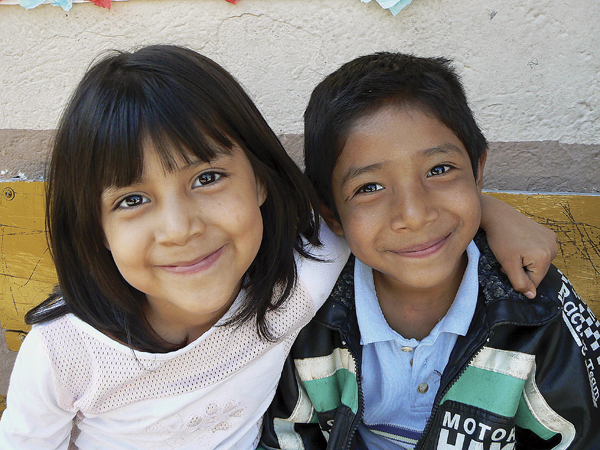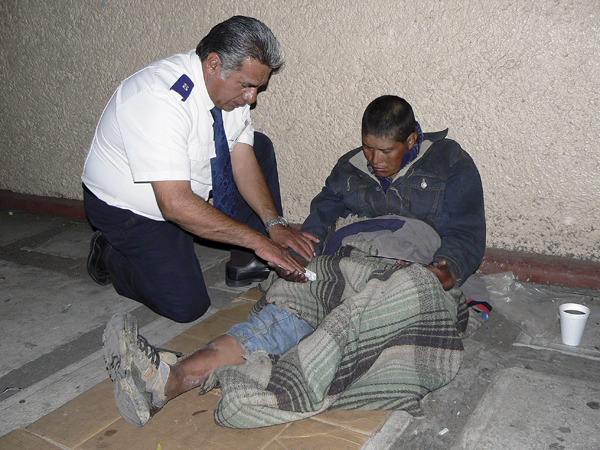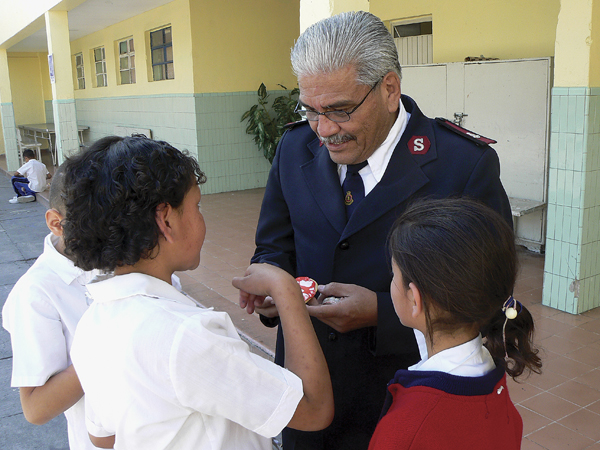
Resident children at the Salvation Army children's home in Cuernavaca.
Long sandy beaches. Sombreros. Luxurious resorts. Cruise ships on the ocean’s horizon. That’s what a typical Canadian might first think of when Mexico comes up in a conversation. But there is a Mexico that tourists generally don’t see and for most local residents, the reality is very different.
Mexico is a country with a population of more than 107 million. Few of us would know that an estimated one in five Mexicans can’t afford to eat. With almost 43 percent of the population under the age of 18, there are many hungry children.
We hear in the business reports that Mexico is developing economically, yet the average factory worker’s wage is less than $8 US per day-and that’s for those lucky enough to have a job. Many men, women and even children migrate long distances from their homes in hopes of getting work and the result is an epidemic proportion of Mexican families being broken up. But it gets worse. For some, the journey ends when they get trapped as victims of human trafficking. Poor women and children in particular are the easiest prey.
Yet even with all the different facts I’d researched before boarding my flight, I was still not sure what to expect when we stepped off the plane in Tijuana. I had never been to Mexico, nor had my travelling companion, Major Gillian Brown, associate director of world missions, THQ.

A soldier prays with an injured man during street ministry in Mexico City.
As the plane descended, I could see a high corrugated metal fence that is the distinct border separating the United States from its southern neighbour. Within hours of landing in Tijuana, we were at The Salvation Army’s Albergue Para Migrants-a centre that not only serves as a corps and houses the officers but is also a large shelter for homeless men. It is so full that many sleep in an old school bus parked in front of the building. As we arrived, the shelter’s kitchen was full of men off the streets, many eating the only meal they will have that day.
I talked to them and discovered there were many different stories. Some had illegally made their way north from different places in South and Central America, hoping to find work. Others had left rural Mexican villages in hopes of eventually getting to the United States, where they hear work is plentiful. I was most surprised to hear how many men had been deported from the U.S.A. after residing there for years. They are now living in limbo, not fitting into either society.
The corps officers collect a small nightly fee and run weekly “street bazaars†(like our thrift stores), but the shelter still struggles to find funds for basics such as laundry money to wash the many blankets. For the many men at the shelter who do not get beds or a space on the old school bus, even sleeping on the concrete floor with a blanket is a safer option than sleeping in the streets.
Border towns also have other problems, such as being centres for human trafficking. As families get separated or parents take low-paying jobs in local factories, their children are often left to fend for themselves, making them easy prey. In an effort to educate and keep children out of harm’s way, The Salvation Army is currently in the process of opening a new care centre in the La Gloria area outside of Tijuana. It will be part of our own territory’s anti-human-trafficking effort.
Culinary Training
The situation was not much different in Puerto Vallarta, where local poverty is in close proximity to the constant influx of tourists and cruise ships. The suburbs are poor, and drugs, alcohol and despair fuel social problems. But there is hope. Like their counterparts elsewhere, the local Salvation Army runs children’s care and feeding programs. It was interesting to discover that a retired Canadian couple-a chef and a teacher-volunteer weekly at the centre, teaching older children culinary and serving skills that they can use to get work in the tourist trade. Although the rented property is small, Captain Mario Lataban, corps officer, is planning the construction of a new children’s facility that is to be built on a piece of land recently secured. There are many hurdles and various funding issues, but the captain is determined to move the much needed new building forward.

Major Cesar Centeno interacts with children at the Salvation Army children's home in Guadalajara
In Guadalajara, The Salvation Army has been running a children’s residence for several decades. Some families who cannot afford to raise or feed their children have had to leave them at the home. Thus the facility has had several generations of children who have grown up knowing only the corps officers as their mother and father. We visited a former resident who now runs a successful restaurant in downtown Mexico City. He said he still knows no other family than those he grew up with in the Army’s children’s residence.
The children require constant care seven days a week. Yet, in addition to running the home, Majors Guadalupe and Cesar Centeno also run an outreach food distribution program.This involves collecting donated food and distributing it in a poor shanty community located by railway tracks on the outskirts of Guadalajara.
Human Trafficking
We eventually ended up in Mexico City, where the metropolitan area is the second largest in the world with a population around 26 million. Here, the Army’s programs are broad and diverse. In addition to a strong network of corps inside and outside the city limits, programs for women and children are central to the work being done. Other centres include a mental health clinic, a men’s shelter and a weekly street ministry at a pediatric hospital.
Over the next few days we visited several children’s residences and feeding programs. In Cuernavaca, about an hour north of Mexico City, we met three children who had been directly affected by human trafficking. They had been abandoned on the doorstep of The Salvation Army’s home because their mother had suddenly left to pursue “work†she was offered in the United States. Many in Mexico are lured into accepting such opportunities, only to find out later that they are trapped in situations they had not expected.
In Cocotitlan, a new Army outpost is being established. Much work needs to be done to a piece of property that was recently donated, but already there is a group of women who bring their children and gather regularly. It is a good indicator that, as in other parts of Mexico City, a strong home league will be part of this new corps’ ministry.
Much Work to be Done
The list of Salvation Army programs and ministries we visited in Mexico is long. Yet, everywhere we went there were smiling children and a hope that life will get better. The needs may seem overwhelming, but I know the Mexican Salvation Army-Ejército de Salvacion-is making a real difference. I have seen it.
I hope, too, you will also get to see some of the great work the Army is doing in Mexico by viewing this year’s Partners In Mission videos and resource material at your local corps or online at salvationarmy.ca/partnersinmission.
There is much work to be done. Please support our Partners In Mission campaign financially and through your prayers.
by Art Nickel, Media Producer, THQ